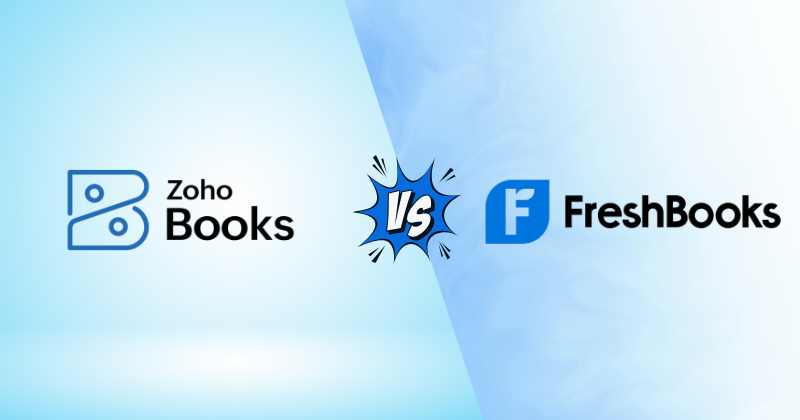Choosing the right accounting software can make or break your business’s financial health. You want a tool that’s simple, reliable, and fits your unique needs without overwhelming you.
That’s where Zoho Books and FreshBooks come in. Both promise to streamline your invoicing, expenses, and bookkeeping, but which one truly works better for you? You’ll discover the key differences, hidden features, and real benefits of Zoho Books vs FreshBooks—helping you make a smart choice that saves you time and money.
Keep reading, because your business deserves the best financial partner.

Credit: fastlane-global.com
Feature Comparison
Zoho Books and FreshBooks offer strong invoicing tools. Zoho Books lets you create custom invoices easily. FreshBooks has simple invoice templates. Both support automated billing and multiple currencies.
Expense tracking is clear in Zoho Books. It allows easy import of receipts and expense categorization. FreshBooks also tracks expenses but has fewer categories.
Project management is stronger in FreshBooks. It helps with task assignments and collaboration. Zoho Books offers basic project features.
Time tracking is built into both. FreshBooks has a simple timer for tasks. Zoho Books offers timesheets and billing by hour.
Reporting in Zoho Books is detailed. It shows financial health with many reports. FreshBooks has basic reports focused on invoices and expenses.
Pricing Plans
Zoho Books offers three main subscription tiers: Basic, Standard, and Professional. Prices start low, making it a good choice for small businesses. FreshBooks has Lite, Plus, and Premium plans, each with more features. Both platforms charge extra for add-ons like additional users or advanced reports.
Extra fees can apply for payment processing or extra users. Zoho Books includes more users in higher plans, while FreshBooks charges per user beyond limits. Both services offer free trials so users can test features. Demos are available to help understand how each works.
User Experience
Zoho Books has a clean and simple interface design. It uses clear menus and icons. FreshBooks looks modern and colorful but can feel busy. Both apps are easy to navigate for new users.
For ease of use, Zoho Books offers quick access to major features. FreshBooks guides users with helpful tips and prompts. Both require little time to learn, but Zoho feels slightly faster to use.
Mobile app performance is solid for both. Zoho Books works smoothly on Android and iOS. FreshBooks also runs well but sometimes loads slower. Both apps let users manage invoices and expenses on the go.
Integrations
Zoho Books and FreshBooks both support many third-party apps. Zoho Books works well with apps like Zapier, G Suite, and Slack. FreshBooks also connects to tools like Gmail, Stripe, and Trello.
For payment gateways, Zoho Books offers options like PayPal, Stripe, and Authorize.Net. FreshBooks supports Stripe, PayPal, and Square. Both let you accept payments easily.
| Feature | Zoho Books | FreshBooks |
|---|---|---|
| Accounting Software Compatibility | Works well with Zoho CRM and Zoho Inventory | Integrates with QuickBooks and Xero |
Customer Support
Zoho Books offers support 24/7 via email and live chat. Phone support is available during business hours. FreshBooks provides phone, email, and live chat support but only during limited hours. Both have help centers packed with guides and FAQs.
Zoho Books has a rich knowledge base with tutorials and videos. FreshBooks offers easy-to-understand articles and how-to guides. Both platforms keep their resources updated regularly.
Community forums are active for both tools. Zoho Books has an official forum where users share tips. FreshBooks has a user community and social media groups. These forums help users solve problems fast.
| Aspect | Zoho Books | FreshBooks |
|---|---|---|
| Support Availability | 24/7 Email & Chat, Business hours Phone | Limited hours Phone, Email, Chat |
| Help Resources | Detailed tutorials, videos, FAQs | Guides, articles, FAQs |
| Community & Forums | Official forum with active users | User groups, social media communities |
Security And Compliance
Zoho Books and FreshBooks both take data protection seriously. Zoho Books uses 256-bit SSL encryption to keep your information safe. FreshBooks also employs strong encryption and regular security checks. Both platforms back up your data to prevent loss.
Regulatory compliance is key for these tools. Zoho Books follows GDPR and other local laws to protect user privacy. FreshBooks meets PCI DSS standards for secure payment processing. Both companies update their policies to stay legal and safe.
Best Use Cases
Zoho Books suits small to medium businesses needing strong accounting. Freelancers and service-based businesses find FreshBooks easy and fast for invoicing. Both tools serve different business types well.
Zoho Books offers better scalability for growing companies. It supports more users and complex accounting needs. FreshBooks fits best for small teams or solo entrepreneurs with simpler needs.
| Feature | Zoho Books | FreshBooks |
|---|---|---|
| Customization Options | Offers detailed invoice and report customization | Simple, user-friendly templates with limited changes |
| Ideal Business Types | Small to medium businesses, startups | Freelancers, consultants, small service firms |
| Scalability | Supports growing teams and complex needs | Best for solo or small teams |

Credit: www.fahimai.com

Credit: www.vintti.com
Frequently Asked Questions
What Are The Main Differences Between Zoho Books And Freshbooks?
Zoho Books offers comprehensive accounting features suitable for various business sizes. FreshBooks focuses on invoicing and time tracking for freelancers and small businesses. Zoho integrates well with other Zoho apps, while FreshBooks provides simpler, user-friendly interfaces.
Which Software Is Better For Small Business Accounting?
Zoho Books is ideal for small businesses needing robust accounting and automation. FreshBooks suits freelancers and very small businesses prioritizing easy invoicing and expense tracking. Your choice depends on business complexity and specific feature needs.
How Do Zoho Books And Freshbooks Pricing Compare?
Zoho Books offers competitive pricing with multiple plans based on users and features. FreshBooks has tiered pricing mainly based on the number of billable clients. Both provide value but differ in plan structures and included features.
Can Zoho Books And Freshbooks Integrate With Other Tools?
Yes, Zoho Books integrates seamlessly with Zoho Suite and third-party apps like payment gateways. FreshBooks connects with popular apps like Stripe, PayPal, and project management tools. Integration options enhance workflow efficiency in both platforms.
Conclusion
Both Zoho Books and FreshBooks offer strong features for small businesses. Zoho Books suits users needing detailed accounting tools. FreshBooks works well for those wanting simple, easy invoicing. Consider your business size and needs before choosing. Each platform has unique strengths to help manage finances.
Take time to compare pricing and usability. The right choice depends on what fits your workflow best. Choose wisely to keep your business organized and efficient.
